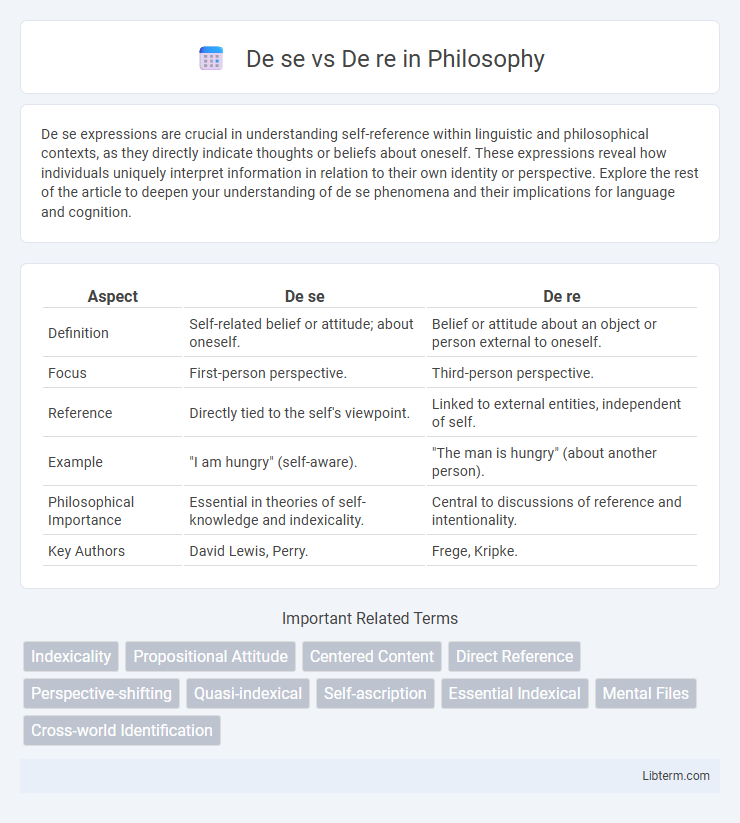De se expressions are crucial in understanding self-reference within linguistic and philosophical contexts, as they directly indicate thoughts or beliefs about oneself. These expressions reveal how individuals uniquely interpret information in relation to their own identity or perspective. Explore the rest of the article to deepen your understanding of de se phenomena and their implications for language and cognition.
Table of Comparison
| Aspect | De se | De re |
|---|---|---|
| Definition | Self-related belief or attitude; about oneself. | Belief or attitude about an object or person external to oneself. |
| Focus | First-person perspective. | Third-person perspective. |
| Reference | Directly tied to the self's viewpoint. | Linked to external entities, independent of self. |
| Example | "I am hungry" (self-aware). | "The man is hungry" (about another person). |
| Philosophical Importance | Essential in theories of self-knowledge and indexicality. | Central to discussions of reference and intentionality. |
| Key Authors | David Lewis, Perry. | Frege, Kripke. |
Introduction to De Se and De Re
De se and de re represent distinct modalities in the philosophy of language, focusing on self-reference and external reference, respectively. De se concerns expressions tied to an individual's self-awareness or perspective, while de re involves referring directly to objects or entities independent of the speaker's beliefs. Understanding the distinction clarifies issues in belief ascriptions, indexicals, and propositional attitudes in semantic theory.
Defining De Se Attitudes
De se attitudes involve self-directed mental states where an individual represents themselves from a first-person perspective, essential for understanding self-reference in philosophy of mind and language. Unlike de re attitudes that attribute properties to objects irrespective of the subject's perspective, de se attitudes require the subject's awareness of themselves as the entity involved. This distinction is crucial for modeling belief reports, indexicals, and the semantics of self-ascriptions in cognitive science and linguistic theory.
Understanding De Re Attitudes
De re attitudes involve belief or desire about an object as it is, independent of the particular way the subject knows it, contrasting with de se attitudes which are self-referential. Understanding de re attitudes is crucial for analyzing propositional attitudes in philosophy of mind and language, especially in relation to indexicality and reference. These attitudes highlight the cognitive significance of objects themselves rather than the mode of presentation, enabling clearer insight into reference, belief reports, and semantic interpretation.
Historical Background of De Se vs De Re
The distinction between de se and de re originated in philosophical discussions on self-reference and propositional attitudes, prominently developed by philosophers like Peter Geach and David Lewis in the 20th century. De se attitudes involve self-ascriptions of mental states directly related to the subject's self-awareness, while de re attitudes pertain to an external reference without necessarily involving self-identification. Historical debates centered on how language and thought represent self-consciousness and the implications for theories of indexicals and belief attribution.
Philosophical Significance of the Distinction
The distinction between de se and de re beliefs highlights the difference between self-related attitudes and objective attitudes toward objects or propositions. Philosophically, this distinction is crucial for understanding self-consciousness, as de se beliefs involve a first-person perspective that cannot be captured by merely describing external facts. It also impacts theories of mind and language by emphasizing the unique role of self-reference in cognition and communication.
Key Examples Illustrating De Se and De Re
The distinction between de se and de re attitudes is clearly illustrated by examples such as believing "I am hungry" (de se) versus believing "He is hungry" when knowing it's oneself (de re). In de se, the subject's self-awareness shapes the belief directly, exemplified by a person recognizing their own need to eat. De re attitudes, such as recognizing "John is hungry" with knowledge about John being oneself, involve beliefs about an object or individual independent of self-perspective.
De Se in Linguistics and Semantics
De se expressions in linguistics and semantics refer to self-referential thoughts or statements where the subject has a first-person perspective or self-awareness, such as "I am hungry." These expressions are crucial for understanding indexicality, where the meaning depends on the speaker's identity and context. Unlike de re interpretations that describe objects or people from an external viewpoint, de se captures the internal, subjective viewpoint essential for modeling beliefs, attitudes, and intentions in communication.
Challenges in Analyzing De Se Attitudes
Analyzing de se attitudes presents challenges due to their inherent self-referential nature, which complicates distinguishing between first-person and third-person perspectives in propositional attitudes. Traditional semantic frameworks often struggle to capture the perspectival features essential for de se belief reports, leading to ambiguity in interpretation. Computational models and formal semantics continue to develop nuanced approaches to accurately represent these subjective self-ascriptions within attitude ascriptions.
Implications for Theories of Mind and Reference
De se attitudes involve self-ascriptions of beliefs or desires, reflecting a first-person perspective essential for understanding self-consciousness in theories of mind. De re beliefs concern objects or entities independently of the subject's perspective, highlighting challenges in reference and intentionality in linguistic and cognitive frameworks. Distinguishing between de se and de re is crucial for analyzing how individuals represent themselves versus external objects, impacting semantics, epistemology, and the philosophy of language.
Conclusion: De Se vs De Re in Contemporary Philosophy
Contemporary philosophy distinguishes de se attitudes as self-referential, directly involving the subject's first-person perspective, whereas de re attitudes pertain to objective properties of objects independent of self-awareness. This differentiation clarifies puzzles in indexicality, belief ascription, and intentionality, emphasizing how agents represent themselves uniquely compared to external entities. Understanding de se versus de re attitudes enhances analyses of self-consciousness, self-knowledge, and the semantics of belief reports in current epistemology and philosophy of mind.
De se Infographic

 libterm.com
libterm.com